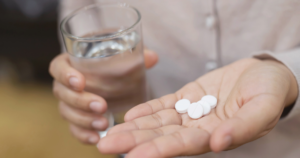Children’s Safety Alert: Medication Safety
September 28, 2021 According to federal data, medications are the leading cause of unintentional poisoning cases in children. In fact, the Centers for Disease Control and Prevention (CDC) report that every day, healthcare professionals provide emergency medical care to more than 300 children between the ages of 0 and 19 as a result of being poisoned. Even more tragically, approximately two children die from their injuries each day. Childproofing your home and keeping certain household items and medications out of reach of children is one of the best ways that parents and caregivers can prevent these catastrophic incidents from occurring.
According to federal data, medications are the leading cause of unintentional poisoning cases in children. In fact, the Centers for Disease Control and Prevention (CDC) report that every day, healthcare professionals provide emergency medical care to more than 300 children between the ages of 0 and 19 as a result of being poisoned. Even more tragically, approximately two children die from their injuries each day. Childproofing your home and keeping certain household items and medications out of reach of children is one of the best ways that parents and caregivers can prevent these catastrophic incidents from occurring.
Poisoning Hazards
Poison is a leading cause of accidental fatalities in children and adults alike. For example, the American Association of Poison Control (AAPC) reports that there are more than 2 million poisonings annually. Children and teens are notorious for the curious nature, so they face even higher chances for sustaining catastrophic injuries associated with unintentional poisoning than adults do. The CDC cites drug use and abuse as one of the most significant risk factors in the increasing rate of unintentional poisoning injuries and deaths in children, though there are several other factors to be aware of as well. Some of these other risk factors include the following:
- Medications like over-the-counter medicines, prescription drugs, supplements, vitamins, and calcium channel blockers. Not only is it important to lock these medications up, but also it is equally critical to keep medications in their original packaging to prevent children from gaining access to them. Children safety and health experts also recommend that parents and caregivers avoid telling their children that their medicine is “candy” and to avoid taking medications in front of kids, who are more likely to mimic their loved one’s actions
- The majority of poisonings occur in someone’s home, and most of them happen in the bedroom, bathroom, or kitchen. Cleaning supplies like scrubbing powders, drain cleaners, and other common consumer cleaning products can be poisonous if a person uses them incorrectly or ingests them. Experts say that drain cleaners are particularly hazardous due to their level high of toxicity. Individuals should dispose of these products immediately after use and should always keep them out of the reach of children. A good tip for preventing children from accessing these products is to put them in a cabinet that you secure with a safety lock
- Mixing household chemicals can create poisonous gases. Never mix cleaning products and be sure to discard or dispose of old or outdated products. You can dispose of these products at hazardous waste disposal drop off point in your community
- Even certain household plants like lilies, hemlock, oleander, pothos, ivy, and caladium are toxic. Children can experience accidental poisoning when they eat the leaves, blossoms, berries, or roots of these plants. They can also sustain severe injuries from coming into contact with leaves, sap, or by drinking water from the plant tray or ingesting soil
Signs and Symptoms of Unintentional Poisoning in Children – and When to Call for Help
Children are particularly vulnerable to poisoning due to their small size. While some substances are usually only toxic in larger doses, if a child ingests even a small amount of a drug, venom, gas, or chemical, they can experience catastrophic or fatal medical complications. According to the Mayo Clinic, parents and caregivers should keep a watchful eye out for the following possible signs and symptoms of poisoning in children:
- Burns or redness around the mouth and lips
- Vomiting
- Difficulty breathing
- Drowsiness
- Confusion or other altered mental status
- Breath that smells like chemicals, such as gasoline or paint thinner
The Mayo Clinic recommends that people who suspect their child has ingested a poisonous substance or product search the area for empty packages or pill bottles and scattered medications. They should also inspect the child for burns, stains, or odors on their person as well as on nearby objects. Also take into consideration that the child may have swallowed a button battery or applied a medicated patch.
Per the Mayo Clinic’s recommendations, if your child is uncontrollably restless, having difficulty breathing or has stopped breathing, is drowsy or unconscious, having seizures, or is known to have ingested a medication (or any other substance) and accidentally overdosed, call 9-1-1 right away. And remember: it is always a good idea to have the nationwide poison control center number saved in your phone in case of an emergency (1-800-222-1222).
Philadelphia Personal Injury Lawyers at Galfand Berger, LLP Representing Injured Victims Since 1947
Galfand Berger LLP has offices located in Philadelphia, Bethlehem, Reading and Lancaster, we serve clients throughout Pennsylvania and New Jersey. To schedule a consultation, call us at 800-222-8792 or complete our online contact form.
 Google Screened
Google Screened
